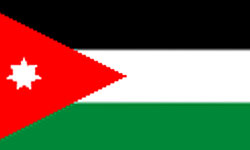Arab Diplomats: US, Qatar Coordinating to Destabilize Jordan

 The US and Qatar are coordinating plans to destabilize Jordan, Arab sources warned on Wednesday, adding that both countries are making hectic efforts to this end.
The US and Qatar are coordinating plans to destabilize Jordan, Arab sources warned on Wednesday, adding that both countries are making hectic efforts to this end.
“The US and Qatar’s embassies (in Jordan) in a coordinated move are recruiting groups in Jordan to strike at the country’s stability,” the Arabic-language al-Manar weekly quoted Arab diplomatic sources as saying.
Qatar has recently augmented its moves and meddling in several regional states. Sources disclosed earlier this week that Qatar has also been trying to destabilize Syria and Kuwait.
On Sunday, Russian analysts said that the Jordanian king is deeply fearful that the destabilizing efforts made by Turkey, Egypt and Qatar lead to an uprising in his country.
In an article titled ‘Jordan: Arab Spring May Come in January’ published in The Voice of Russia website, Nikita Sorokin wrote that King Abdullah II of Jordan fears that popular uprising may soon grip his country.
According to him the new “axis” of Turkey, Egypt and Qatar may contribute to the spread of such an uprising. It is not ruled out that amid the clashes in Syria and the deterioration of the domestic situation the run-in scenario of the Arab uprisings will be implemented in Jordan, Sorokin added.
According to local media, it is the union of the Turkey- Egypt-Qatar axis with the Muslim Brotherhood which makes the King anxious. Abdullah II thinks that Ankara’s position on Syria is sectarian and is based on religious hatred of Sunnites of the Allawi regime of Bashar Assad. Qatar’s intensive activities with regard to Syria are also worrying him.
He thinks there is a great possibility that Damascus will become part of the abovementioned axis if Assad’s regime falls, the report noted.
The Arab Spring has already affected Jordan. Only last month several people were killed in protest rallies. Mainly, the protesters demanded lower price on gasoline but there were also appeals to overthrow the King. Abdullah II is trying to maneuver between the interests of his supporters and the ambitions of the opposition. Recently the King issued a decree to release 116 most active protesters but insisted that 13 the most avid initiators should stay in prison, the article added.
The local division of the Muslim Brotherhood is the king’s main headache. In late September they threatened to bring 50,000 people to the streets. In order to prevent rallies the king started talks with the Islamists. The Islamists are the changes in the system of parliamentary elections. If Abdullah agrees to a constitutional monarchy, and the reform of the electoral legislation the Muslim Brotherhood will have a chance to legally come to power as it was in Egypt.
Nevertheless, the King has made some concessions. On October 4, he disbanded the parliament and promised that from 2013 the Prime Minister will be elected by the lawmakers and not appointed by the monarch.
But the compromises made by the King failed to find an adequate response among the Muslim Brotherhood. They still plan to boycott the early parliamentary elections slated in January 23.
The report came a day after new demonstrations took place throughout Jordan, as political parties rallied to tell the government, “We, Jordanians, are the red line”.
The Friday protests, aimed at demanding political reforms to stop corruption, also demanded the release of political prisoners, arrested in November for protesting against fuel price hike.
Demonstrators chanted, “The people want to overthrow the government” and “Those who increased the prices want to burn the country.”
Clashes erupted between pro-regime supporters and activists in the Jordanian capital.
Other protests took place in the rest of the country, such as Faquou and el-Mazar. Organizers condemned the government policies and called for a boycott of the upcoming elections.







